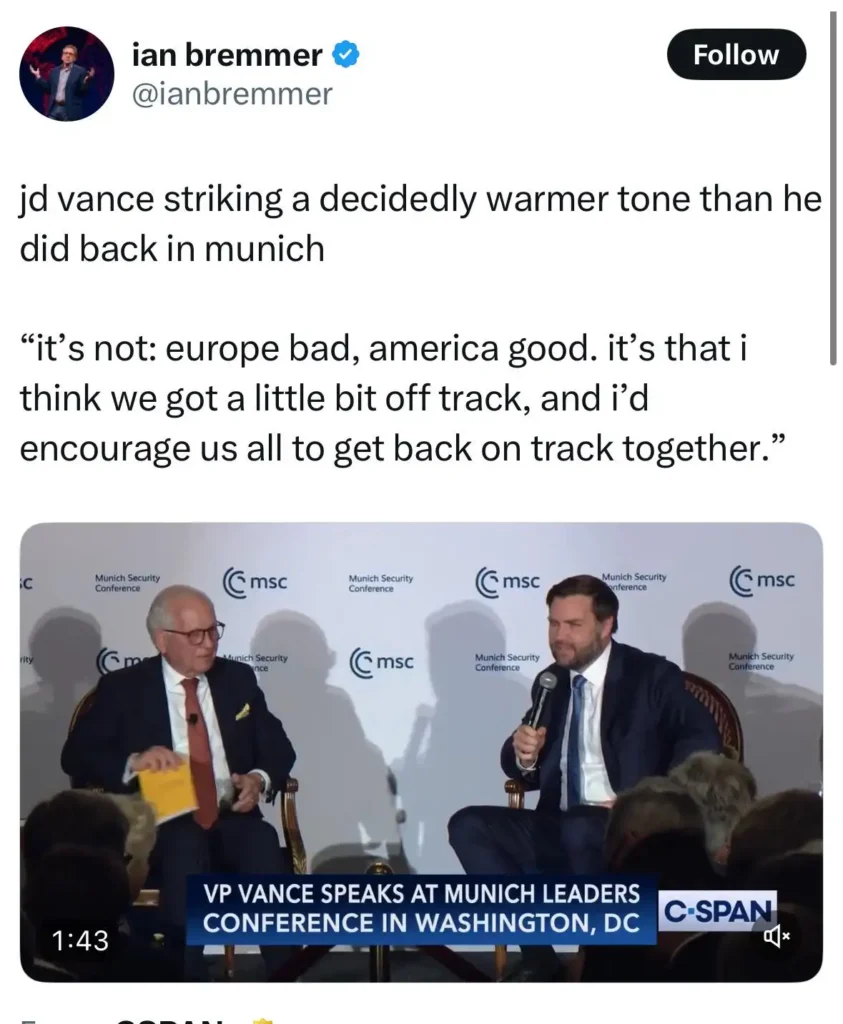Washington, D.C. — U.S. Vice President JD Vance’s abrupt shift in tone toward Europe—from open criticism to calls for renewed partnership—is being met with skepticism, frustration, and outright dismissal across European public discourse.
In a Reddit thread that quickly gained traction, users on r/Europe did not hold back. Many expressed the sentiment that the U.S. has once again demonstrated a volatile foreign policy approach: “burn bridges first, think later.” The prevailing mood was one of distrust toward Washington’s ability to sustain coherent, predictable alliances.
“Regardless of if Europe’s values align with those of the US,” one user wrote, “there cannot be any significant trade or defense relationship with a country whose administration changes their mind every two minutes completely unpredictably.”

This reaction comes after Vance’s stunning pivot. At the Munich Security Conference in February, he lambasted European leadership for alleged failings in democracy and governance. Fast-forward to this month, and Vance is extending an olive branch, claiming the U.S. and Europe are on “the same team.”
But the European crowd isn’t buying it.
“Has he said thank you yet?” asked one user, sarcastically. Another flatly stated, “Screw them. They showed their true faces long ago.”
This kind of whiplash from Washington has prompted many Europeans to suggest rethinking the continent’s dependency on U.S. defense and trade. Some argued it’s time for Europe to act in its own self-interest without illusions of brotherhood across the Atlantic. “Europe should be pragmatic and pursue deals that are in its own interest, but nothing beyond that,” read one popular comment.
Others took it further, pointing to broader systemic issues in the transatlantic relationship. “We need to focus on ourselves and strengthen from within in all areas—economic, political, security,” said one, while another bluntly added: “American Economy, go fuck yourself.”
There was also speculation that Vance’s softened tone is tied to fears of European nuclear proliferation. One user noted, “The risk of European countries pursuing their own nuclear deterrents is something the US has wanted to prevent since Kennedy… Europeans openly doubting American guarantees is seen as a big risk.”
Economic grievances also played a central role in the discussion. Referencing past Trump-era policies, a commenter noted how the U.S. underestimated the global reaction to tariffs: “Now American ports are empty, e-commerce sites have added ‘tariff tax’ in itemised receipts at checkout, and grocery prices are skyrocketing.”
Underlying all the critiques was a consistent message: trust, once lost, is not easily regained.
As one user succinctly put it: “You can’t treat somebody like shit and then 1 month later act like all the nonsense you spewed about them is forgotten.”
JD Vance’s newfound diplomatic language may aim to reassure European allies, but online reaction suggests the damage from past rhetoric runs deep—and won’t be smoothed over by a few carefully worded speeches.